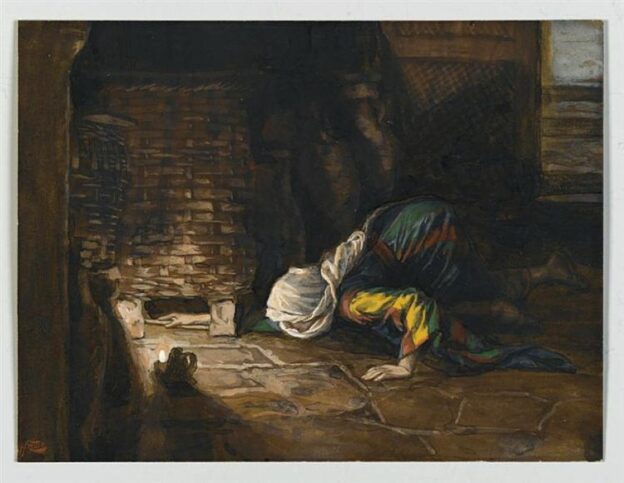See Luke 1:5-25; 57-79
During Advent season you hear the Songs of Christmas from Simeon and Anna, Mary and the angels. Before those songs were sung, however, the people of God sang “O Come, O Come Emmanuel.” They sang it and sang it, but did they really mean it? Or did they sing it like we tend to sing that song? – O Come, O Come Emmanuel and stand right over there where it is safe. We want him to come, but not close enough to disturb our comfortable existence. We want him to come like a Christmas card in the mail and not like the roaring lion he really is.
But let’s hear the Advent song Zechariah sang. Zechariah has been waiting and waiting but when Emmanuel finally comes he hesitates. As we read Zechariah’s story we will see how God uses the tool of silence to make Zechariah ready to sing “O Come, O Come Emmanuel” and really mean it.
I want you to take a moment to think about the last time you experienced silence. By silence I mean that you weren’t talking, no one around you was talking, the television was off, there was no music playing, you weren’t reading, playing a game on your phone or surfing the internet. I’m guessing for a lot of us those moments come few and far between. We live in a really noisy world and we have been trained to feel like we need background noise – even in places like elevators and the grocery store. So, when we do find ourselves in a rare moment of silence it can feel a little uncomfortable and we scramble to fill in the dead space.
A few months ago NPR aired a story about a group of scientists who were curious about the lengths people will go to in order to avoid silence. They put together a study in which people were invited to sit in a room alone without any phones, electronics or reading material. Before the scientists left the room they pointed out a button and told the test subjects that if they pressed it they would receive a pretty serious electrical shock. The scientists explained that they didn’t have to press the button. They just wanted them to know what it was. The researchers backed out of the room and, of course, watched what happened through a two-way mirror. As they suspected, the test subjects immediately became uncomfortable in the silence. But here’s the part that they hadn’t predicted: person after person, in fact a large majority of the people tested, chose to press the button and give themselves the electrical shock. They were so uncomfortable that they were willing to do anything to distract themselves from the silence.
The silence that sometimes makes us so uncomfortable is actually a tool God uses to teach and guide us to the next place on our journey.
The Waiting
You are going to like Zechariah. If you haven’t heard his story before, I’m glad, because many of us who have heard it have come away with a picture of Zechariah in the role of bad child. People tend to view him as the bad boy of Christmas – the one person who wasn’t willing to immediately get on board when the angel showed up with the game plan. But as we look more closely at Zechariah we begin to root for him. As the story starts, he is a good guy who is following God the best way he knows how.
God wanted to expand Zechariah’s spiritual world. He wants to do a new thing in Zechariah’s life and it scares him. It is scary, isn’t it, when we’ve got the old thing worked out? We know what’s expected and it’s comfortable. Sometimes we get a glimpse of what’s further ahead on the road and we get wistful thinking about it but then we come back to our safe place. But God is a merciful shepherd who calls to us to move. And then one day we begin to sense God gearing up to do something new. And it’s unsettling.
God entered into Zechariah’s comfortable state and started stirring. Zechariah’s world wasn’t perfect. But he had figured out how to survive in it and now he’s nervous about leaving it behind.
Luke is the only one of the four gospels to include this story about Zechariah. It’s interesting, because what happens to Zechariah is the event that gets Christmas rolling. Even before the angel appears to Mary, Zechariah’s story unfolds. This is the moment that breaks 400 years of silence as the people of God wait for the Messiah.
Right away we learn some things about Zechariah. He lived in the time of Herod. This is the Herod, the one who met with the wise men and killed every male child two and under in Bethlehem in a failed attempt to kill Jesus. Herod was a sociopath who had a pattern of killing anyone who might get in his way, including his father-in-law, a few of his wives and a couple of his own sons. Living in Israel under this man’s rule was scary.
We also learn that Zechariah is a priest. In the Jewish religion, you didn’t wake up one morning and hear a calling to become a priest. If you were a man born into the priestly line, you automatically became a priest. That means Zechariah was raised in a house of priests, his dad, uncles, and brothers were all priests. He even married a woman, named Elizabeth, who was the daughter of a priest.
Starting in a few chapters, Jesus will have some really harsh things to say to the religious leaders of the time, including priests. But look at how verse six describes Zechariah and Elizabeth. They observe all the Lord’s commandments and regulations blamelessly. That’s high praise. This involves more than just the 10 commandments. It would have included rules about how they ate and dressed and worshipped and worked – every aspect of their lives. And they kept them blamelessly. It also says they were upright in the sight of God. Jesus’ problem with the majority of the religious leaders was that they were content to be upright in their own eyes or in the eyes of other people. But Zechariah and Elizabeth faithfully lived their lives in a way that pleased God. They were the real deal.
The last thing we are told about Zechariah and Elizabeth is that they have experienced a great sadness. They have been unable to have children. Verse seven describes them as “well along in years” – in other words, that door is now shut and they’ve been forced to give up the dream of ever having a child of their own.
If you are ever tempted to believe the prosperity gospel, I want you to remember Zechariah and Elizabeth; they have done everything right and yet they are not spared this great sadness.
Let’s see how Zechariah and Elizabeth get mixed up in the Advent story.
Because a new priest was born every hour, there may have been as many as 18,000 priests in Israel but there was only one temple. So the priests were divided into divisions and each division was assigned two weeks a year to serve at the temple. While they are on duty, the priests’ job was to offer sin sacrifices and teach – mostly quiet, behind the scenes tasks. Each day though a priest was chosen by lot to perform a special task – to burn the incense.
Burning the incense was a great honor made even more special because you were only allowed to perform this duty once in your whole life. After you had completed your turn your name was removed from the drawing. The priest who was chosen would take a hot coal from the altar in the temple’s outer courtyard where the sin sacrifice had been made and would carry it into a special room in the temple and use it to heat the incense. As it burned, the incense would rise up towards heaven and represent the people’s prayers for forgiveness. They were asking for God to accept the sacrifice that had been made. This task was done alone. Just the priest in a closed room in front of the altar.
Zechariah, by this point maybe as old as 80, has been serving as a priest for perhaps 60 years. He is finally chosen to be the one to burn the incense. He’s probably a bit stunned but doesn’t have time to fully process his emotions because he has to get to work. No time to update his Facebook status! He’ll just have to tell everyone later.
With great reverence and nervousness, Zechariah begins the ritual. If it had been me I would have been thinking, “Don’t drop the coal. Don’t drop the coal.” He gets into the temple. Can’t you hear the angel thinking, Oh great, here we go again! If I could just give my messages without having to take time to calm everybody down first I could get a lot more done. “Okay Zechariah, head between your knees and take deep breaths…”
This angel’s message is a little different than the others though. The messages to Mary and the shepherds were announcements, but this angel came with a response to Zechariah’s personal request. The angel says, “your prayer has been heard.” What has Zechariah been praying about? He wants a child.
You might be thinking, if this is an advent story why isn’t the angel announcing Jesus’ birth? We will see that this baby being born is all tied up in the story of Jesus. Doesn’t this give a glimpse of our kind God, a God who in the process of launching a plan to save the whole world takes the time to answer someone’s deepest prayer? God could have given John to anyone. But he chose Zechariah and Elizabeth.
Now the angel is going to let Zechariah in on who John will be and how he will be connected to the coming Messiah. Wow! Zechariah is going to be John the Baptist’s dad! His child would grow up to lead a revival in Israel and baptize Jesus at the start of his public ministry. Jesus will say of John in Luke chapter seven, “among those born of women there is no one greater than John.” To be told of your child’s greatest accomplishments before they are even born would be a lot to take in. Remember, this started as a normal day for Zechariah. This is all coming pretty fast. But he has now composed himself enough to think of a few questions. Look at verse 18.
I love how he describes himself as “an old man” but refers to Elizabeth as “well along in years.” Spoken like a man who’s been married for a long time! “How can I be sure of this?” This sounds like a reasonable question. Zechariah has been comforting a sad wife for a lot of years. He would like to hear some specifics before he starts passing out the cigars.
Can’t you hear what Zechariah’s soul is really saying? “We are trying really hard to put this behind us. We’ve figured out how to live this existence and we are doing a good job. We are serving you. We are obeying you. What more do you want from us? We are finally comfortable here. Please just let us be.”
Have you ever had that conversation with God? “God, I can’t do any more. I can’t go any farther. I’m doing pretty well. I’ve come a lot farther than a lot of other people I know. I come to church. I attend a group. I’ve stopped drinking. This is far enough” We can envision the Promised Land that God wants to take us to. But the path there seems hard and long and scary. Maybe where I am is good enough?
The Silence
Let’s see what God thinks about this in verses 19 and 20: if Zechariah needs proof, he’s going to get proof. The angel begins by telling him his name – Gabriel. I can’t think of many times when an angel arrives on a scene and announces his name. Angels exist to make God famous, not themselves. But the name Gabriel would have been familiar to Zechariah from his story in the book of Daniel where he appears and interprets prophetic dreams. Hearing that name would have made Zechariah take notice.
If that’s not enough, Gabriel reminds Zechariah that he stands in the presence of God. Let that sink in a moment. While you sit here, angels are standing in the presence of God awaiting his command.
Finally Gabriel says “I’m trying to give you good news!” This is what you wanted!
Zechariah is having a really hard time letting go of the existence he has carved out for himself. He knows how to do life where he is. Letting go of what he knows for the unknown ahead is very hard.
But God is not content to let Zechariah stay in his current place. Gabriel delivers the prescription God has written to heal Zechariah of his disbelief – silence. You know, the thing we are willing to give ourselves an electrical shock to avoid. Nine months of silence.
We need to be careful here not to confuse teaching with discipline. God is not angry at Zechariah. Remember God considered Zechariah upright. If God wanted to punish Zechariah he could have easily done it. The pronouncement could have been “because you dared to question me, you will not receive the child.” God is much more concerned with healing and leading Zechariah than he is with punishing him. God is much more concerned with healing and leading you than he is with punishing you.
It’s easy to read the Bible sometimes and hear an angry, disappointed or irritated voice in your head. That might be the voice of a parent, a teacher, a coach or even your own condemning voice but it is not God’s voice. As you open his Word ask him to let you hear his voice. God is in the process of healing Zechariah and moving him to the next place he has prepared for him. So we need to hear his tone as kind and loving.
Why silence? Because it is when we are silent that God gets a chance to talk. We rush into God’s presence like a nervous person on a first date. We feel the need to fill up all the space with noise. Talking and talking, we unload our worries and requests. Give a quick thank you and excuse ourselves. We might feel better momentarily because we’ve gotten things off our chests. But we have not heard from God or learned anything.
When we refuse to be silent we are saying that we have nothing left to learn or that God has nothing left to say to us. We’ve heard it all. We know it all. Do we really believe that God has something he wants to say to us? Do you really believe that God has something he wants to say to you – something new and fresh? Not the thing he said 10 years ago or even last week. Something new today, even if it’s just that he loves you. If we do, then we need to be quiet.
Not every time we spend a moment in silence will the heavens open and God descend. But when we begin to intentionally build time into our routines for silence we will experience a greater sense of his presence. Sometimes we walk away from those moments knowing that we have heard from God. Other times we shrug our shoulders and wonder if anything happened. And then weeks later we see fruit appearing and we know it is a result of our time spent in silence.
God has written this same prescription of silence for all who follow him. The good news is that we don’t have to start with nine months of it, or even an hour. But we do need to plan for it. Silence doesn’t usually find us. We have to find it. Here are some ideas to get you thinking about where you might find some in your everyday life:
1. We all spend a lot of time in the car. Are there times when you can turn it into a quiet place?
2. Instead of a spoken prayer before a meal, spend a few moments in silence.
3. Perform a household chore in silence.
4. Take a walk or exercise in silence.
5. Don’t turn on the TV at bedtime. Fall asleep in silence.
6. Read a verse of Scripture or other devotional material and sit silently with it fresh on your mind.
7. Be honest about whether you are numbing yourself or being silent at the end of a stressful day.
Pick one thing on this list and try it this week. Next week add another or try a different one. Try not to get frustrated if heaven and earth don’t move every time you are silent. Silence and waiting go together. Zechariah had to wait nine months.
Here’s another thing to remember: God does not announce everything he is doing in us as he does it. He does not show up at the door with a punch list. “Today I’m going to give you more patience, dig out that root of bitterness and heal a memory.” That’s not how it works. When we are surrendered, he dives into our beings with his tool belt on and he heals and refreshes and creates new things in us. The evidence we see that he has been at work? The fruit of the Spirit. One day you won’t react the same way you would have before in a situation and you suddenly realize – God has been at work.
That’s what he was doing during the nine months that Zechariah sat silently. Zechariah finished his assignment at the temple and went home. The specifics of what happened in Zechariah’s soul are a mystery, perhaps even to Zechariah. But we do know that silence proved to be an effective tool.
By the time his baby is born, Zechariah has been re-born. God has done a new work in him.
The Song
Elizabeth has had the baby and their family and friends gather when he is eight days old for his circumcision. It’s a party! No one can believe that this has happened. Every baby is celebrated but it is clear that this baby is special.
Now this special baby needs a name. Of course the crowd gathered wants to name him after Zechariah. Isn’t this what Zechariah has been waiting for, a son who bears his name? But apparently Zechariah has communicated to Elizabeth exactly what the angel said because she knows his name is supposed to be John.
The crowd is confused and motions to Zechariah to jump in and agree with them. He asks for a tablet and with four words demonstrates the work God has accomplished in the silence – his name is John.
Zechariah has given up his right to pass on his name, his need to have control, and his desire to have his expectations met. This is not the fruit that punishment produces. Zechariah was not punished. He was given a gift – the gift of silence.
Zechariah’s last words in the temple are questioning and disbelieving. His first words recorded in verse 64 are of praise.
Now Zechariah is ready to sing his song of Christmas. He picks up his son and as he is praising God, he is suddenly filled with the Holy Spirit and begins to prophesy.
The words to this beautiful song are printed below. As you read this song, would you underline the words that jump out at you? Sometimes God’s voice is just that soft. He can make a word or phrase come alive as you read. When that happens, don’t over think it, just underline it.
Praise be to the Lord, the God of Israel,
because he has come and has redeemed his people.
He has raised up a horn of salvation for us
in the house of his servant David
(as he said through his holy prophets of long ago),
salvation from our enemies and from the hand of all who hate us-
to show mercy to our fathers and to remember his holy covenant,
the oath he swore to our father Abraham:
to rescue us from the hand of our enemies,
and to enable us to serve him without fear
in holiness and righteousness before him all our days.
Now, Zechariah looks down at the baby in his arms and sings the second verse of his song.
And you, my child, will be called a prophet of the Most High;
for you will go on before the Lord to prepare the way for him,
to give his people the knowledge of salvation
through the forgiveness of their sins,
because of the tender mercy of our God,
by which the rising sun will come to us from heaven
to shine on those living in darkness and in the shadow of death,
to guide our feet into the path of peace.
Zechariah got to sing a song of Christmas but he had to be silent first. I just want to skip the silence and get right to singing the song. And I want to sing the song that I wrote. A song that tells of the life and purpose I have envisioned for myself. Zechariah sang the song the Holy Spirit gave him in the new place that he was led to.
I want to give you an opportunity to experience a small taste of silence. This week will be noisy, won’t it? Will you let yourself be quiet for just a few moments and let God fill your heart with his peace?
Here are some ways you can use these minutes:
1. Take your copy of Zechariah’s song – the one that you underlined. Pick one of the words that stood out to you and ask God what he wants you to hear in that word. Then sit silently.
2. You may want to ask God, “where do you want to take me next?” Or you may be ready to say “I will go wherever you are leading.” Then wait in silence.
3. If you feel uncomfortable, tell God and ask him to show you why.
4. Or you may welcome the opportunity to enter into his presence and rest quietly.
God, I wonder if we avoid silence because we are afraid that you will not speak to us. We worry in our deepest places that you are not real. Do we avoid silence because we worry that you are angry with us? That if we give you a chance to speak it will be with angry words? Heal that in us so that we can sit at your feet and hear what you have to say to us. We want to trust you; take us to the place where we are able to trust enough to sit silently with you.




